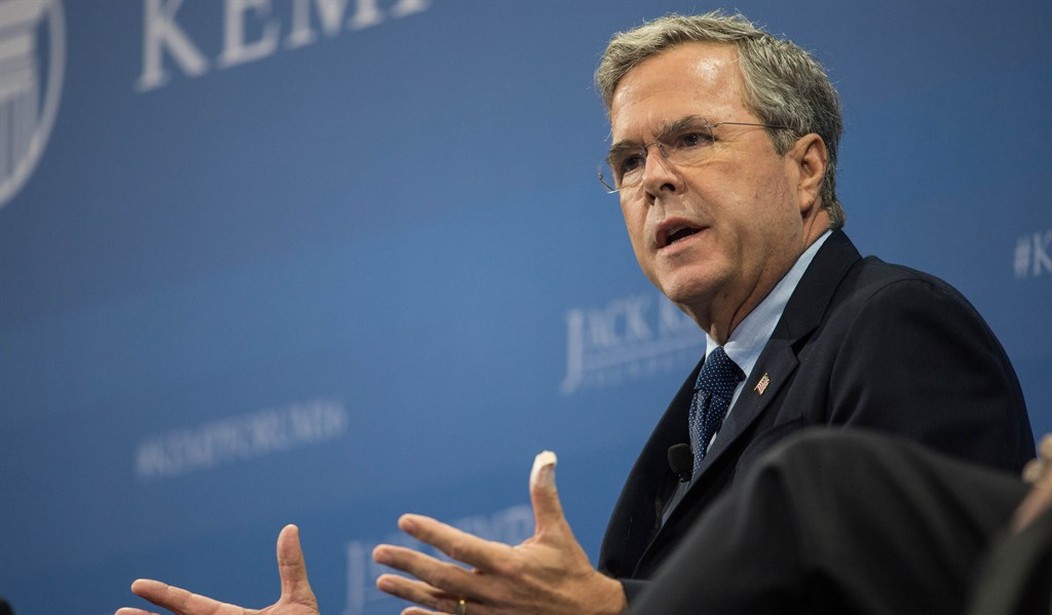At a time and day -- 8:30 a.m. on a Saturday -- when most Americans are sleeping in, the Kemp Forum on Expanding Opportunity convened in the capacious Columbia, South Carolina, convention center. Even at 8:15, it was tough to find a seat.
South Carolina's important primary is Feb. 20, and doubtless some of the more than 1,500 attendees were attracted by the opportunity to hear from six of the Republican candidates for president. (It would have been seven, but Carly Fiorina missed her flight.) Jeb Bush, Ben Carson, Chris Christie, John Kasich, Marco Rubio and Mike Huckabee offered their views on how to fight poverty and expand opportunity. Ted Cruz and Donald Trump declined to attend.
The absence of Cruz and Trump was significant, underlining as it does one of the two competing ideas about what the Republican Party is and should be. Sen. Cruz and, to a lesser degree, Trump seem to endorse the notion that Republicans can win national elections by motivating the "missing conservatives" who stayed home in past presidential election years because the party's nominees were moderates. This is the line doggedly pushed by talk radio, but it has been pretty well debunked.
There's another interpretation of where the Republican Party needs to be -- not just to win elections but also to reform the nation. It's the reform conservatism approach embraced by Speaker of the House Paul Ryan, who was one of the hosts of the Kemp Forum (the late Jack Kemp was Ryan's political mentor). Ryan was joined by South Carolina Sen. Tim Scott. Just by themselves, Ryan and Scott confound the image of Republicans as unlikeable or aloof or, in the oft-repeated poll result from 2012 that determined Mitt Romney's fate, people who don't "care about the problems of people like me."
Recommended
"I hated being poor," Ben Carson recounted. "For years I thought I had been born into the wrong family." Governors Bush, Kasich and Christie spoke of their efforts to fight poverty through education reform, crime control, expanding the earned-income tax credit and block granting welfare programs. As Paul Ryan put it, "We've been fighting a war on poverty for over 50 years, and I don't think we can conclude anything other than that this war has been a stalemate. Fifty years, trillions of dollars, yet today if you are born poor, you are just as likely to wind up in poverty as you were 50 years ago."
The discussion was wonky and sincere and mutually respectful. There were three panels featuring presidential candidates and interludes with South Carolina politicians Gov. Nikki Haley and Sen. Lindsay Graham. Not an insult was hurled. There was no chest thrusting or alpha-male posturing. You could fantasize that this is what campaigns for president should always be. Poverty, Ryan argued, is not just a matter of "deprivation" but also of "isolation." There was much talk of drug abuse, poor schools and the problem of incarceration. Kasich endorsed racial set asides, which may not win many plaudits from conservatives, and he, Chris Christie and Mike Huckabee endorsed more drug treatment as an alternative to prison. The idea that we are incarcerating large numbers of people for simple possession of drugs appears to have become conventional wisdom, though it's wrong.
Where conservatives shine is in their emphasis on the importance of mediating structures in the lives of the poor (and everyone else for that matter). The family, the church and private charities can give people more than a check: They can provide the guidance, the supervision, the understanding and even, sometimes, the kick in the pants to get and keep people on the right track. To the degree that government elbows those mediating institutions aside, it creates the "poverty trap" -- offering just enough support to keep people from destitution but then penalizing them for working to better themselves.
Will large numbers of poor people abandon the Democrats and vote Republican? Hardly. But when Republicans address the problems of poverty, they demonstrate their connection to ordinary people. Rubio noted that "if you are a child born into a broken family, in an unstable home, in a dangerous neighborhood, in substandard housing, in a school that's failing in your community, where the people on the street corners are drug dealers or not good role models, you've got six strikes against you."
One of the biggest strikes against Republicans is the perception that they are indifferent to the problems of everyone except bankers and entrepreneurs. The Kemp Forum was a well-placed blow to that image.
























Join the conversation as a VIP Member